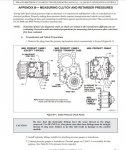Dont have them on yet. It has had to wait untill i could get my cab suspension fabricated. The C7 pressure isnt monitored, which is why I will need to hook up a pressure gauge. The solenoid electrical circuit is Monitored, Which is how I know it has a good circuit, because it sets a 45-23 code(H solenoid circuit open) when I unplug it. Unfortunately this makes testing the circuit activation signal more difficult, because as soon as it senses a bad circuit, it disables the diff-lock output. So I will need to either probe the wires, or connect the circuit to an appropriate resistance relay Coil. There is an alternate circuit in the wiring Allison specs to drive a diff-lock light. We use that circuit and relay K34 on the FMTV to control the power divider lockup in mode on the 6X trucks, but this wont tell me the signal is being sent to the transfer diff solenoid, or if the solenoid is acting upon it, so still need to monitor that signal and C7 pressure… which is why I need to ID the test port fitting.
It Looks about the size of a -4 SAE, but I haven't pulled a plug yet… that would be convenient as I already have everything I need to gauge a -4 port.



